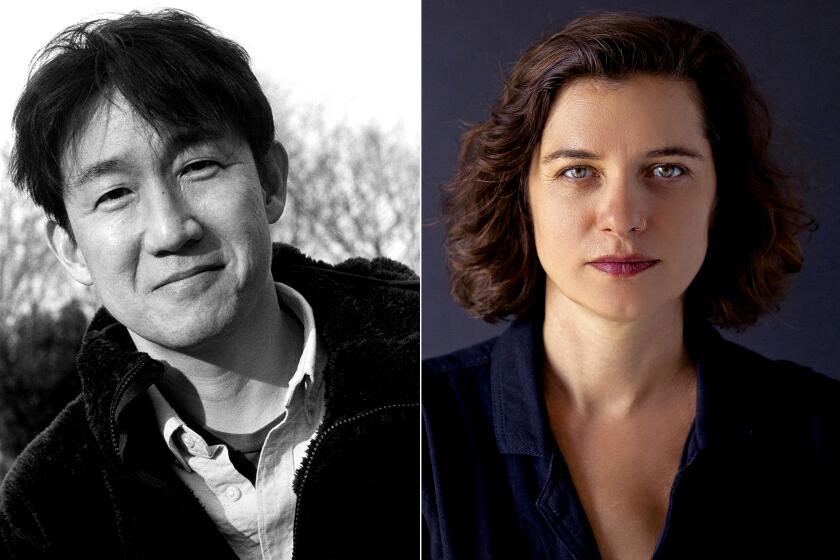In the new ‘Howards End’ opera, Edwardian London is 1950s Boston, and Leonard Bast is black
The well-meaning sisters Schlegel and the mansplaining Henry Wilcox are bound for the opera stage: “Howards End,” the E.M. Forster novel adapted into a 1992 film and 2017 BBC television series, will be reborn as a chamber opera premiering this weekend in San Francisco.
“Howards End, America” turns Forster’s tale of class relations, betrayal and real estate into a three-act, two-hour-plus opera for seven singers at Z Space. Librettist Claudia Stevens and composer Allen Shearer have moved the novel’s setting from Edwardian London to 1950s Boston during the McCarthy era and added race to the story’s conflicts.
“I liked the feeling of the place as a liberal enclave, and I thought American audiences would better identify with the narrative,” Stevens said by phone from the married couple’s Oakland home.
The two traverse their backyard — Shearer working from a garden studio, Stevens from a home office — to collaborate.
“It’s more or less how we’ve been doing it for 10 years,” said Stevens, 69, of the seven operas they have created in that time.
A classically trained pianist with a penchant for sturdy English novels (they last adapted George Eliot’s “Middlemarch” for opera), Stevens first sketched some scenes from Forster’s “A Passage to India.” For various reasons, including the fact that the later Forster book wasn’t in the public domain, she turned instead to “Howards End.”
“If you’re doing a long work, and you know it’s going to be a two-year project,” she said, “you have to be sustained creatively by a work of literature that has real depth, complexity and what you can conceive as a great stage piece.”
I wanted to sharpen the class snobbishness you see in the book to a different kind of snobbishness, a meanness in the opera that has a political undertone.
— Librettist Claudia Stevens, who by setting the opera in the 1950s gives new context for the half-German Schlegel sisters
To bring in the politics of race and societal attitudes of the 1950s, she wrote the English lower-class clerk Leonard Bast and his wife, Jacky, to be African American. That change, she said, made more convincing the wealthy Wilcoxes’ refusal to accept responsibility for the Basts when they become homeless as well as the “forbidden love” between Helen Schlegel and Bast.
“That was unheard-of, even in liberal Boston; a girl like Helen, who went to Radcliffe; that she could take up with a married African American man and give birth to his child,” said Stevens, who lived in Boston as a graduate student in the mid-1970s.
As in the novel, the Schlegels are half-German. But with the opera set in the post-World War II political climate (specifically 1956-57, not long after the McCarthy hearings), she said, the socially progressive sisters are suspected of communist leanings.
“I wanted to sharpen the class snobbishness you see in the book to a different kind of snobbishness, a meanness in the opera that has a political undertone to it,” Stevens said. Henry and his son Charles are “not only prejudiced of people of another race, but they are suspicious of those who have liberal tendencies.”
African American characters also lend a clash of cultures represented in the music by jazz tones that contrast with European classical music, epitomized in the opera by borrowing from Beethoven’s Fifth Symphony. “I think it was a very important choice to make,” Stevens said.
Shearer, 75, agreed.
“The musical thing that ties us most to that era is the scene with Jacky reminiscing about singing in the nightclub,” he said.
Stevens chose Marblehead, a tony seaside village north of Boston, to locate the cottage named Howards End. In the opera’s final scene a projected image merges the ocean with the house as characters onstage move from the beach toward the home. It suggests, Stevens said, that there will be reconciliation, if not among the three adults, then maybe the generation of the baby inheriting the house.
“We don’t know what perils they face,” she said, “but we’re left with hope.”
Support our coverage of California artists and the California arts scene by becoming a digital subscriber.
See all of our latest arts news and reviews at latimes.com/arts.
More to Read
The biggest entertainment stories
Get our big stories about Hollywood, film, television, music, arts, culture and more right in your inbox as soon as they publish.
You may occasionally receive promotional content from the Los Angeles Times.






